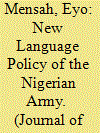| Srl | Item |
| 1 |
ID:
090590


|
|
|
|
|
| Publication |
2009.
|
| Summary/Abstract |
This paper discusses one aspect of learning Japanese as a second language (L2), which is how learners acquire Japanese causative constructions. Causatives are considered to be rather 'marked', because main and sub-events are merged into a single clause, and thus may be more difficult to learn. Yet, ability to use such constructions enhances expressivity and pragmatic-cultural appropriateness, and facilitates comprehension. Cross-sectional oral production data were collected from English-speaking university students of Japanese L2 for this study. Their descriptions of causative eventualities were examined and related to their L2 developmental stage. Results show that the range of choices of construction correlates with learners' stage of development and consequently (i) that there are universal constraints in L2 learning, as proposed by Processability Theory, and (ii) that Japanese L2 development follows a predictable route. Results entail implications for accurate, efficient communication as well as for Japanese L2 learning and teaching.
|
|
|
|
|
|
|
|
|
|
|
|
|
|
|
|
| 2 |
ID:
165922


|
|
|
|
|
| Summary/Abstract |
I argue in this paper that the new language policy of the Nigerian Army recognizes and promotes the dominant languages as resources for military training, intelligence gathering and peace building, while the dominated languages are marginalized, alienated and relegated, thus the policy infringes on the fundamental linguistic rights of speakers of minoritized languages in the army. I further maintain that the Nigerian Army’s exclusive language policy is harmful to the army as a national institution and call for explicit status planning of the Nigerian Pidgin to serve as the language of wider communication in the army in response to its emerging sociolinguistic challenges.
|
|
|
|
|
|
|
|
|
|
|
|
|
|
|
|